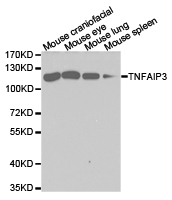TNFAIP3 Rabbit Polyclonal Antibody
USD 665.00
USD 200.00
USD 867.00
Specifications
| Product Data | |
| Applications | IHC, WB |
| Recommended Dilution | WB 1:500 - 1:2000 |
| Reactivities | Human, Mouse, Rat |
| Host | Rabbit |
| Isotype | IgG |
| Clonality | Polyclonal |
| Immunogen | Recombinant protein of human TNFAIP3 |
| Formulation | Store at -20C or -80C. Avoid freeze / thaw cycles. Buffer: PBS with 0.02% sodium azide, 50% glycerol, pH7.3 |
| Concentration | lot specific |
| Purification | Affinity purification |
| Conjugation | Unconjugated |
| Storage | Store at -20°C as received. |
| Stability | Stable for 12 months from date of receipt. |
| Gene Name | TNF alpha induced protein 3 |
| Database Link | |
| Background | A20, also referred to as TNF-a-induced protein 3 (TNFAIP3), is cytokine-inducible protein that functions to inhibit apoptosis and activate NF-?B. It was first identified as a TNF-a inducible primary response gene in human umbilical vein endothelial cells, and encodes a 790-amino acid protein containing seven Cys2/Cys2-zinc finger motifs. Constitutive expression of A20 is observed in lymphoid tissues, but it is transiently expressed in a variety of cell types in response to inflammatory signals such as TNF-a, IL-1, phorbol esters, and LPS . Expression of A20 can confer resistance to apoptosis and NF-?B activation triggered by these signals, probably through interference with TRAF (TNF receptor associated factor) family members , and interaction with the NF-?B inhibiting protein ABIN. Studies also show that A20 contains site-specific ubiquitin modifying activity that can contribute to its biological functions. The amino-terminus of A20 contains de-ubiquitinating (DUB) activity for Lys63 branches, such as those found in TRAF6 and RIP, while the carboxyl-terminus contains ubiquitin ligase (E3) activity for Lys48 branches of the same substrates and leads to their degradation . |
| Synonyms | A20; OTUD7C; TNFA1P2 |
| Reference Data | |
| Protein Families | Druggable Genome |
| Protein Pathways | NOD-like receptor signaling pathway |
Documents
| Product Manuals |
| FAQs |
| SDS |
{0} Product Review(s)
Be the first one to submit a review






























































































































































































































































 Germany
Germany
 Japan
Japan
 United Kingdom
United Kingdom
 China
China



